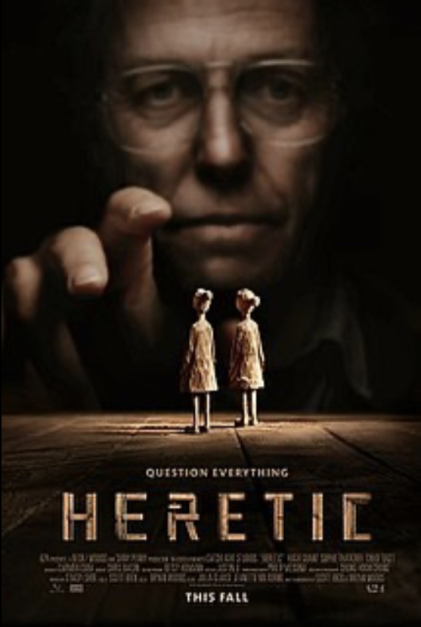
Light Spoilers for Heretic.
If you’ve been astutely following my movie reviews since March of 2023, you may remember that I wrote an article with a very similar title to this article about the grammy winning film The Whale. In that article, I talked at length about the writing and performances in that film and how they provide general audiences with an opportunity to reflect on their ethics and their worldviews.
It is with an immense feeling of happiness that I again, with the release of the theological-horror film Heretic, get to talk about the relationship between art and good philosophy.
Heretic follows two Mormon girls, Sister Barnes (Sophie Thatcher) and Sister Paxton (Chloe East) as they get softcore kidnapped by Mr. Reed (Hugh Grant), a theology nut that is trying to make a character study of the girls’ actions as he bombards them with prompts that have them questioning their religious beliefs.
This is another case where I don’t think that just summarizing this movie and giving my brief thoughts on it would do the film justice, so I will instead intertwine my review with a broader point about what makes this type of film so important. Here, we will be starting with the point of moral ambiguity.
From a Hollywood deep dive on theological philosophy, you would probably expect the film to take the side of atheism. This, however, is not at all the case with Heretic. The film’s protagonist uses her faith to guide her through the scenarios that she’s put in, questioning them as much as any healthy religious person should. Moreover, Mr. Reed, the antagonist, is the non-believer.
With these characteristics in mind, though, this is where the film truly strives. While Mr. Reed is by all accounts a bad man, agnosticism and atheism are not given an unfair argument in the film. On the contrary, Mr. Reed presents a very strong argument against religion. What makes this work is that Sister Paxton presents an equally strong argument in favour of her religion. Heretic is morally ambiguous enough to the point where claiming that it is a defense of a specific religious belief would be ignorant; it is simply a neutral theological discussion.
The moral ambiguity presented, however, can only be as strong as the arguments presented. It’s easy to be morally ambiguous when neither of the sides have particularly compelling arguments. In Heretic, however, this is not a problem. Mr. Reed, for example, provides a compelling analogy between the Abrahamic religions and the different iterations of Monopoly, or reused melodies in songs. What initially seems like a strong argument is then shot down by adequate scrutiny from Sister Barnes. This movie is so incredibly good at providing compelling arguments for all sides.
So, where does this leave us regarding philosophy in film? Well, this movie was so compelling that I’ve since become a hobbyist of theological philosophy. I’m currently reading both the Bible and Tao Te Ching and plan to continue reading important religious texts. A philosophical movie that can convince anybody to read any religious text is already one step closer to succeeding at its job, especially considering that most Christians haven’t even read the Bible front to back.
In my article about The Whale, I mentioned that a good movie has the power to change the path of someone’s life. I mentioned how the film Just Mercy has largely inspired me to take my current path in becoming a public defender. I can confidently say that if Heretic had came out in my senior year of high school, I may have been a theology major rather than a political science major right now. And THAT is the power of a great philosophical film. 8.5/10
For more of my reviews, you can go to letterboxd.com/omgmateo













